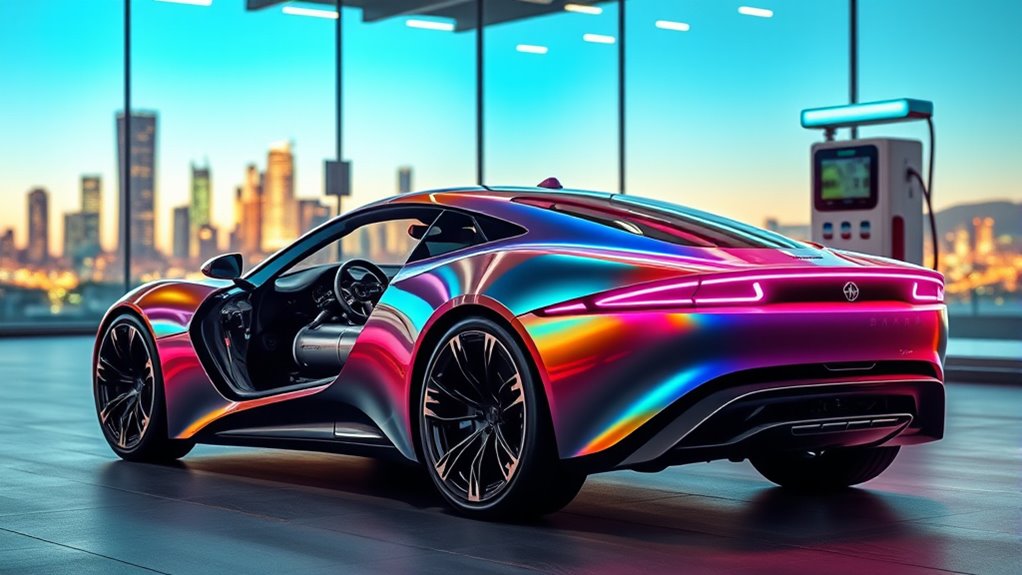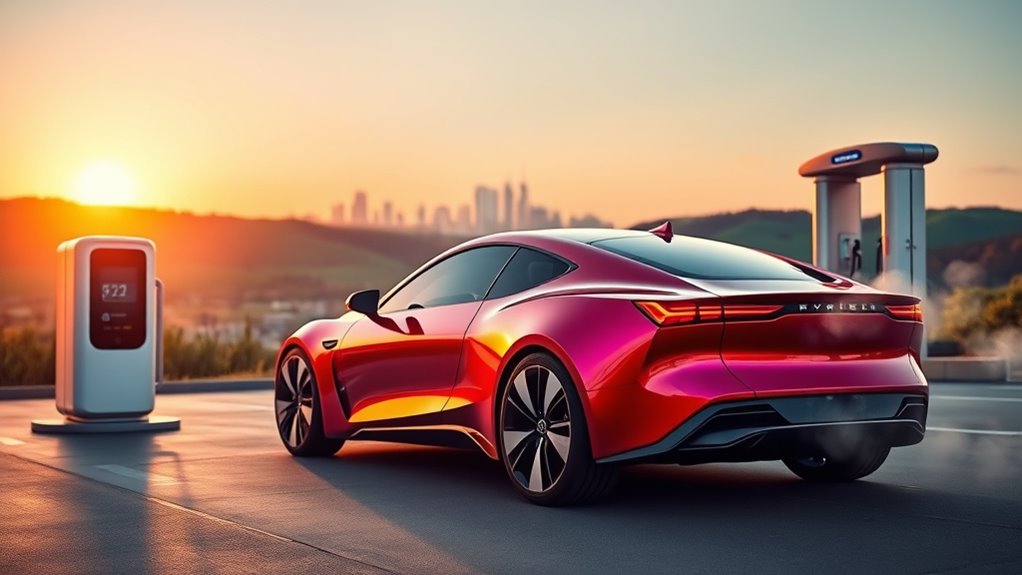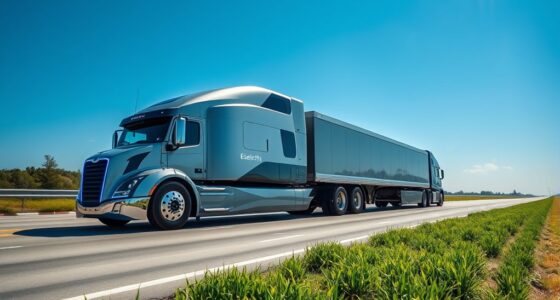Hydrogen fuel cell cars work by converting hydrogen into electricity, which powers the vehicle’s electric motor. They emit only water vapor, making them a clean alternative to traditional vehicles. With quick refueling times similar to gasoline cars, they offer real convenience. The automotive industry is investing heavily in this technology and expanding hydrogen refueling stations. As production methods become greener, you’ll see more of these vehicles on the road, showcasing a promising future for sustainable transportation.
Key Takeaways
- Hydrogen fuel cell cars convert hydrogen into electricity, emitting only water vapor, making them environmentally friendly alternatives to gasoline vehicles.
- The fuel cell stack generates electricity from hydrogen and oxygen, powering the vehicle’s electric motor for efficient operation.
- Quick refueling times, similar to traditional gasoline vehicles, enhance the practicality of hydrogen fuel cell cars for everyday use.
- The industry is shifting towards sustainable hydrogen production methods, such as electrolysis, to reduce carbon emissions and promote environmental goals.
- Ongoing investments in infrastructure and technology advancements are expected to increase the accessibility and adoption of hydrogen fuel cell vehicles in the future.

As the world grapples with climate change and seeks sustainable alternatives, hydrogen fuel cell cars emerge as a promising solution to reduce emissions and enhance energy efficiency. You might wonder how these vehicles operate and what sets them apart from traditional electric or gasoline-powered cars. The key lies in fuel cell technology, which converts hydrogen into electricity to power the vehicle. Instead of relying on fossil fuels that contribute to greenhouse gas emissions, hydrogen fuel cell cars utilize a clean energy source that only emits water vapor as a byproduct.
When you think about hydrogen production, it’s essential to understand the various methods used to create hydrogen fuel. The most common technique is steam methane reforming, where natural gas reacts with steam to produce hydrogen and carbon dioxide. While this method does release some carbon emissions, the industry is shifting towards greener options like electrolysis. This process splits water into hydrogen and oxygen using renewable energy sources, making it a cleaner approach. As the infrastructure for hydrogen production evolves, you’ll see a greater emphasis on sustainable methods that minimize environmental impact. Additionally, hackathons focused on clean energy solutions often explore innovative approaches to enhance hydrogen production efficiency.
Fuel cell technology itself plays a significant role in the efficiency of hydrogen fuel cell cars. The fuel cell stack is made up of multiple cells that work together to convert hydrogen into electricity. When you fill up your car with hydrogen, it travels to the fuel cell, where it combines with oxygen from the air. This reaction generates electricity, which powers the electric motor that drives the car. What’s impressive is the quick refueling time—usually just a few minutes—comparable to filling a traditional gas tank, making it highly convenient for drivers.
The future prospects of hydrogen fuel cell cars are bright as automotive manufacturers increasingly invest in this technology. With major companies developing new models and expanding hydrogen refueling stations, you can expect to see these vehicles become more accessible. Additionally, advancements in hydrogen production techniques will further promote their adoption. As you explore greener transportation options, keep an eye on hydrogen fuel cell cars; they might just be the solution to a cleaner, more sustainable future.
Frequently Asked Questions
Are Hydrogen Fuel Cell Cars Environmentally Friendly Compared to Electric Cars?
Hydrogen fuel cell cars can be environmentally friendly, especially when powered by renewable energy sources. They produce only water vapor as emissions, contributing to emission reduction. However, if the hydrogen is derived from fossil fuels, their environmental benefits diminish. In comparison to electric cars, which can also utilize renewable energy for charging, the overall impact depends on your energy source. So, it’s essential to take into account how the hydrogen is produced and the energy used.
How Long Does It Take to Refuel a Hydrogen Fuel Cell Car?
Refueling a hydrogen fuel cell car typically takes about 3 to 5 minutes at a hydrogen station. You drive up, connect the nozzle to your vehicle, and start the refueling process, which is quick and efficient. This speedy refueling time makes hydrogen cars convenient, similar to traditional gasoline stations. So, if you’re considering a hydrogen vehicle, you’ll appreciate how little time it takes to get back on the road.
What Is the Cost of Hydrogen Fuel Cell Vehicles Today?
Today, hydrogen fuel cell vehicles typically range from $50,000 to $70,000. While this might seem steep, advancements in fuel cell technology and the growing hydrogen infrastructure are expected to lower costs over time. As more manufacturers enter the market and production scales up, you could see prices drop, making these eco-friendly cars more accessible. Investing in hydrogen vehicles now might just pay off in the long run as technology evolves.
Are There Government Incentives for Purchasing Hydrogen Fuel Cell Cars?
Yes, there are government incentives for purchasing hydrogen fuel cell cars. For instance, if you buy a hydrogen fuel cell vehicle, you might qualify for tax credits that can substantially reduce your overall cost. Some states even offer additional government subsidies to encourage eco-friendly transportation. By taking advantage of these incentives, you can make the shift to a hydrogen car more affordable while contributing to a cleaner environment.
How Does Hydrogen Production Impact the Environment?
Hydrogen production can profoundly impact the environment, depending on the methods used. If you rely on fossil fuels for production, it generates greenhouse gases, worsening climate change. However, using renewable sources like wind or solar for electrolysis can minimize environmental harm. You should consider the entire lifecycle of hydrogen production to assess its overall impact. Choosing cleaner production methods can lead to more sustainable hydrogen use, ultimately benefiting our planet.
Conclusion
In the fast lane of innovation, hydrogen fuel cell cars are revving up to reshape our roads. Imagine cruising in a sleek, futuristic vehicle, powered by clean energy, like something straight out of a sci-fi flick. As technology evolves and infrastructure expands, these cars could become your go-to choice for eco-friendly travel. With their potential to reduce emissions and enhance efficiency, hydrogen fuel cell vehicles might just be the key to a greener future, steering us toward sustainability.









